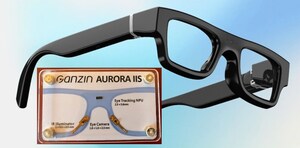
CES 2021 Ganzin's eye tracking technology is a game changer for seamless AR/VR control
TAIPEI, Jan. 12, 2021 /PRNewswire/ -- Foreseeing that AR/VR will be the next revolution that transforms people's life, Ganzin Technology developed a new user interface that allows users to control the device using micro movements of the eyes. Ganzin's cutting-edge technology is going to be exhibited online along with the 100 featured Taiwanese startups selected by Taiwan Tech Arena (TTA) at CES 2021.
"The user interface for computers is a mouse, and for smartphones, it's a touchscreen. We believe the best user interface for AR/VR products is our eyes," said Shao-Yi Chien, Founder of Ganzin Technology and professor at the Graduate Institute of Electronics Engineering, National Taiwan University.
Users get what they see works in the VR world too
Ganzin Technology's Aurora eye tracker module enables AR/VR users to control devices with their eyes or to view the information of an object by looking at it, releasing their hands to perform other tasks. It is possible that, in the near future, assembly line workers in factories will be able to browse and exchange information on objects they are assembling or operating using an AR/VR headset, allowing AR/VR devices to create more value and improve work efficiency.
Ganzin's Aurora eye tracker module is a low-power and easy-to-install eye tracking solution that boasts the smallest profile available on the market today. Aurora is light-source agnostic and may be used both indoors and outdoors, significantly increasing its usability. With a small form factor, the module may be affixed to the frame of any set of smart glasses as well as on AR/VR headsets.
Collaborating with Qualcomm, Ganzin also developed an eye tracking software package on Qualcomm XR platforms. For AR/VR/smart-glasses device makers on these platforms, the cost of integrating eye tracking is minimized, which also lowers the barriers to eye tracking. Ganzin's eye tracking software package is now available on the Qualcomm XR2 platform and will support Qualcomm XR1 in the near future.
Limitless uses for eye tracking
Shao-Yi Chien has identified four key applications for eye tracking technology, including market hotspot analysis, medical treatment, educational training, and mobility aids. For example, eye tracking may be used to check the speed of pupillary constriction during medical treatments to check for eye or brain diseases. It may also be applied in educational training to ensure students follow standard procedures before working online. As for mobility aids, eye tracking technology enables patients diagnosed with a stroke or cerebral palsy to communicate with others.
"Just like 15 years ago, when no one would have thought that everyone would have a smartphone, who can be sure the world will not be dominated by AR/VR devices and smart glasses in another 10 years?" Chien, who strongly believes that eye tracking technology, if combined with the right applications, will change users' habits and ultimately replace smartphones.
A team of young dreamers is here to change the world
Based in Taipei, Taiwan, Ganzin is a collection of young dreamers, most of whom are recent graduates of the electrical engineering powerhouse, National Taiwan University.
Founder Dr. Shao-Yi Chien is also a professor in the Department of Electrical Engineering and Graduate Institute of Electronics Engineering at National Taiwan University. His research interests include computer vision, image processing, computer graphics, and the associated VLSI and processor architectures. He has published more than 200 papers in these areas.
Ganzin is also managed by experienced industry veterans from companies such as NVIDIA, ARM, and ASUS and guided by distinguished professors like the principal founder Shao-Yi Chien and IEEE Fellow Hung-Min Chen, ensuring that the company's boundless dreams are directed toward achievable goals.
CES 2021 TTA-VR Pavilion: https://pse.is/3bemhn
SOURCE Ganzin Technology





Share this article